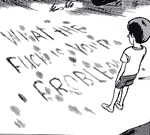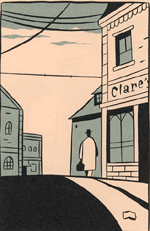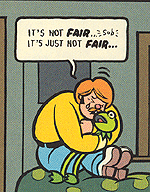I wonder why the other kids didn't like me | |

| I've said before how I feel like an ill-informed impostor in the world of comics; about how my reading Chris Ware, Dan Clowes etc is maybe akin to listening to the Beatles or Radiohead. Maybe I shouldn't feel this way, I dunno. I mean, it's a question of perspective and relativity, isn't it? If I asked a class of 14 year olds how many of them had heard of The Beatles or Radiohead I'd be surprised if there wasn't a whole forest of hands in the air. Asked how many had heard of, say Robert Crumb (the historical figure in 'underground' comics, of course) and I'd be surprised to see one lone outstretched arm. So maybe we can't draw parallels at all. |
Whatever. I've been reading a lot of Clowes recently, specifically his Caricature collection of nine stories from his Eightball comic. Published by Seattle's ace Fantagraphics Books (why doesn't the UK have an equivalent? Or does it, and i just dont know about it?), it's all pretty desolate and melancholy stuff, which is just how I like my comic books thanks very much. Not for me the whiz-bang Sci-Fi of an X-Men or a Spiderman... no, give me the down-beat, quirky existentialism of characters lost in urban facelessness and I'm happy. If happy is the right word, of course. Of course it is. Reading Clowes' strips makes me happy in a way that listening to John Hartford records makes me happy; makes me think of what Lou Reed once said about his records helping to make people feel less alone. Make me think too of what Julian has to say about his Johnny Kane record label when he writes: "on the last day of Johnny Kane records, I imagine the singles as forming a perfect circle of melancholy. I listen to Townes Van Zandt. I believe it made some people happy. Time to move on. might fall in love again, get drunk again, buy scratchy country records again." And you know, that to me is Dan Clowes' comics. That's exactly what I get from a strip like 'Gynecology', 'Immortal, Invisible' or the gem that is 'Like A Weed, Joe'. A way to connect, even if only for a moment. A moment is all it takes, after all. | |

| Speaking of moments, there's a whole string of similar ones in Seth's amazing It's a Good Life, If You Don't Weaken. Originally published across a number of issues of his Palooka-Ville comic, this 'picture novella' is published by Drawn and Quarterly and is sublime. There's so many passages that make me want to weep a ragged smile, make me want to sigh 'that's how it is'. There's so many moments in which I recognise parts of my past present and for all I know future. It really cuts me deep. Like recognising the attitude of 'avoidism' as espoused by Linus in an old Peanuts cartoon (that's the past - I don't think I suffer from that quite so much these days), or the way I feel about people who make a fashion statement about retro-clothing and culture: "why do I dislike these types so much? Maybe it's because they're happy walking around pretending - and I'm not." Best of all is thinking about Tintin every time you see a train, something the character in Seth's book ties into reading The Black Island. It's something I'm not ashamed to say I identify with, Tintin being one of my lasting loves from childhood (and post-childhood - I couldn't actually afford to buy the books until I was in my late teens and early twenties, when I devoured them even more avidly than as a ten year old poring over library copies), and The Black Island being my favourite title of all. It's A Good Life, If You Don't Weaken is a fine exploration of obsession as a means of developing self-awareness; is a book that reflects upon itself, examines its own process and rational as it in turn explores threads of existence. It's poetic, funny, cynical, na¥ve, nostalgic and modern all at once, without ever coming across all post-modern, which of course is a major selling point. It's also beautifully drawn in a style that clearly owes a great deal to the old '50s and '60s New Yorker cartoonists that Seth feels indebted to. If you haven't already picked up on this, then do so immediately. As soon as I finish this I'm off to track down a copy of Clyde Fans Part One, the collected beginning of his latest story, which looks divine of course, and to check out the latest issues of Palooka-Ville for Part Two of the same tale. I also need to check out the gorgeous looking Vernacular Drawings book which collects drawings from his sketchbooks from the past thirteen years or so. Of course, if someone wants to mail me one of the signed copies as an early Christmas gift, they'd be my friend forever... |

| Back to Fantagraphics now, and the most recent addition to Chris Ware's monumental ACME Novelty Library. Once again in an oversize format, this is more of Chris Ware's amazingly inventive wry and supremely melancholic imaginative and observant wit and wisdom. There are regular favourites; Quimby Mouse in what are for me his best strips yet ('Saturday Antics' is amazingly hilarious and bitterly desolate all at once - the strip where Quimby ponders 'I wonder why the other kids didn't like me' before answering himself two frames later (Ware's pacing is supreme) with 'fucking little assholes' is simply priceless); Robot Sam (the opening story here just tears your heart out); the surreal Brazil meets Joy Division Sci-Fi of 'Tales of Tomorrow'. And of course Jimmy Corrigan makes an appearance with a Christmas strip that will have tears in your eyes if you have even the tiniest modicum of soul. Joining these are newcomers Rusty Brown and Chalky White. The Rusty Brown strips are sharply drawn documents of outsiders immersed in their obsessive world of toy collection, but really it's about more than that simple stereotype (think comic book man from the Simpsons and you pretty much have an idea of what Rusty is like - even more so for the great Putty Grey character who appears in the micro-strip tucked away at the bottom of one page here); is instead really about isolation and the inability to connect with a world that denies entry. And really, after all, that's what all of Ware's comics are about. Through a variety of characters he documents lonely lives, and in so doing creates a magnificent paradox: that of publicly mediated isolation. For his Jimmy Corrigan book, Chris Ware has rightly been feted as a great voice. With his latest work he is showing that he has plenty more still to deliver. © 2002 Alistair Fitchett |